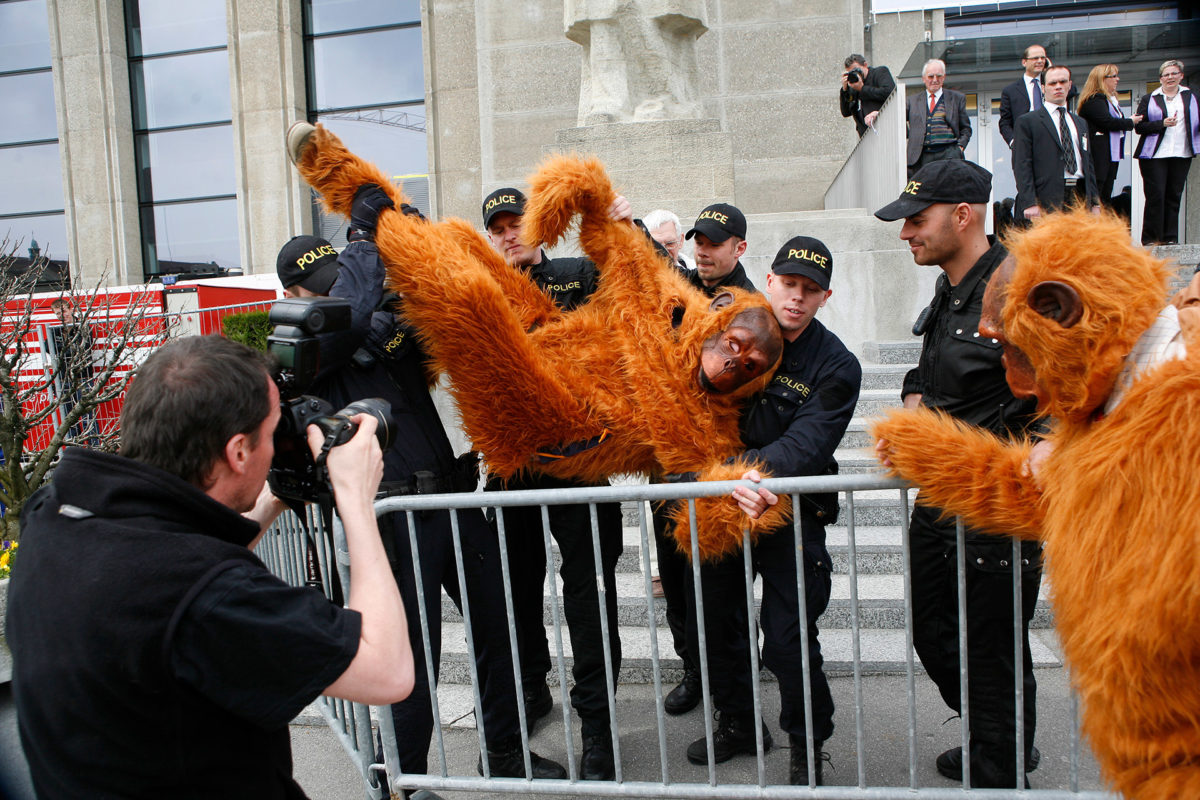Founded more than 50 years ago to protest nuclear testing, Greenpeace has grown to become one of the world’s most influential environmental groups, campaigning on a wide range of issues around the world. Greenpeace is best known for its attention-grabbing, non-violent direct actions to pressure companies and governments, but the organization also employs a variety of other tactics, from in-depth research to strategic engagement, to drive change. Greenpeace’s activism has attracted a legion of volunteers and grassroots donors who complement the organization’s 4,000 staff spread across more than two dozen field offices in more than 50 countries.
Greenpeace’s power is such that when it mobilizes a campaign against a target around a specific issue, even the mightiest of companies finds it difficult to ignore. This approach has pushed a number of Fortune 500 companies — from Unilever to Nestlé to McDonalds — to enact a range of policies, from how they source commodities to how they produce energy. Greenpeace campaigns have pressured governments to disclose data on deforestation, carbon emissions, and fishing practices.

But Greenpeace’s activism has also attracted some powerful enemies: its offices around the world have been raided, companies have sued it, and staff and volunteers have been arrested.
Those efforts haven’t slowed Greenpeace’s work, though. Nor have they colored the organization’s willingness to engage with companies or governments in the long run: Greenpeace prides itself on not holding grudges.
“Greenpeace has no permanent friends or foes,” Greenpeace International executive director Jennifer Morgan told Mongabay during a February 2020 interview. “If a government or company is willing to change, we will work with them to achieve their aims, but if they regress or break promises, we will hold them to account.”

Morgan has headed Greenpeace International, the Amsterdam-based organization that oversees Greenpeace’s mostly autonomous regional offices, since April 2016. Prior to that, she served as the global director of the climate program at the World Resources Institute (WRI) and other leadership positions at E3G and WWF. In those roles, Morgan has attended every United Nations climate change conference (COP) since the first one in Berlin in 1995, which has given her deep insight into climate policy and the eventual creation of the Paris Agreement in 2015.
From that vantage point, she says that Greenpeace’s formula for directly targeting companies and governments works best when the objective is relatively narrowly defined. For broader issues, Greenpeace focuses on influencing culture.
“Greenpeace has traditionally focused our advocacy work on changing laws, governments and corporate behavior to achieve environmental and peaceful outcomes. This has worked well historically to address more specific and defined issues, with clear causes, affects and decision-makers to influence,” she said. “With complex global challenges like biodiversity loss, climate change and social issues the pathway to successful change is too complicated to understand and influence. In these situations Greenpeace believes working to influence and change mindsets is the most effective way to achieve lasting large scale change. As mindsets change, they will pull social norms, political opinions and consumer behavior along with them.
“While politics and leaders certainly can influence culture and norms, we believe culture has much more influence on politics and leaders. Where culture goes, politicians either follow or lose elections, and companies either change or go bankrupt.”

As an example, Morgan cites zero-deforestation policies, which Greenpeace helped set in motion in the late 2000s after a campaign against deforestation for soy production in the Amazon. Within a decade, more than 360 companies, spanning palm oil to wood pulp, had made such commitments, but almost none had actually stopped deforestation in their supply chains by 2020.
“Corporate supply chains for palm oil and other forest and ecosystem risk commodities remain exposed to deforestation and ecosystem destruction, fires and human rights violations,” she said. “We need decisive government action that makes complete transparency and the monitoring of supply chains a condition of trade and finance. This starts with strict due diligence regulations that require financiers and importers to provide proof that products entering global markets are not linked to forest and ecosystem destruction or human rights abuses.”
“Creating a better world is within our reach, but it requires global cooperation at unprecedented levels. It will require system change, not half-baked tweaks. It requires new rules and new investments, not saving the old failed system via adaptation or reform.”
Morgan talked about activism, driving systemic transformation, and more during a conversation with Mongabay founder Rhett A. Butler.

